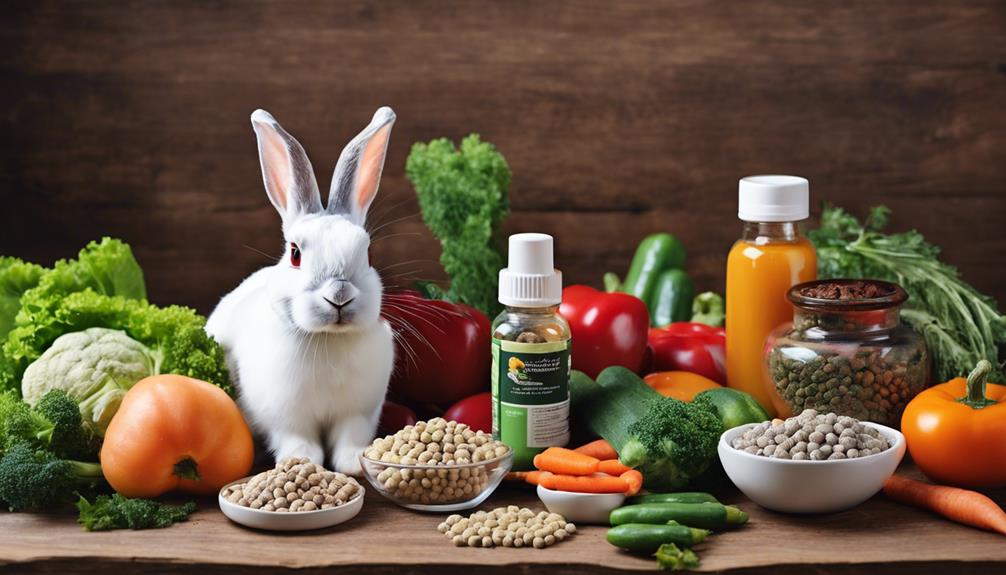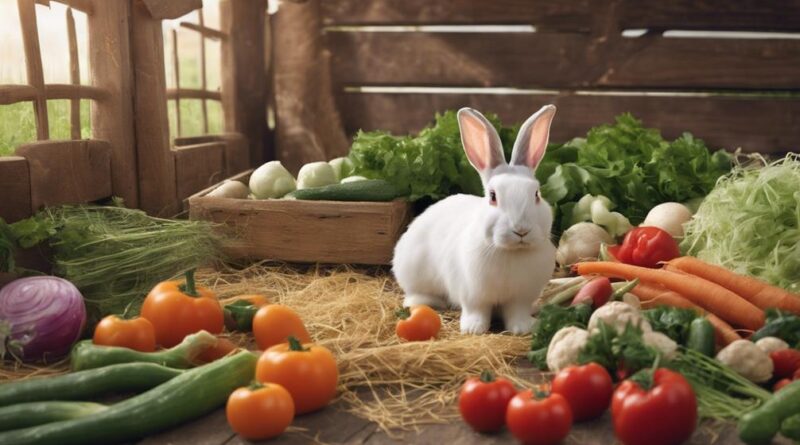Top Daily Diet Recommendations for Your Rabbit
Coincidentally, have you ever wondered about the crucial elements of a healthy diet for your beloved rabbit? Understanding the importance of providing the right balance of nutrients is essential for your furry friend's well-being.
From the foundational role of hay to the inclusion of fresh vegetables and limited fruits, each component plays a vital part in ensuring your rabbit's health.
But what about pellets, herbs, and supplements? Stay tuned to discover the comprehensive guide to optimizing your rabbit's daily nutrition for a long and happy life.
Hay – The Foundation of the Diet
When feeding your rabbit, prioritize providing a plentiful supply of high-quality hay as the foundation of their diet. Hay is essential for your rabbit's digestive health and dental well-being. There are various types of hay available, with Timothy hay being one of the most recommended options due to its high fiber content and low calcium levels, which helps prevent urinary tract issues. Other beneficial hay types include orchard grass and meadow hay, which offer diversity in taste and texture, keeping your rabbit engaged and satisfied.
In terms of feeding schedule and quantity, ensure that your rabbit has access to fresh hay at all times. A good rule of thumb is to provide a bundle of hay that's equivalent in size to your rabbit daily. This amount may vary depending on your rabbit's size and breed, so it's crucial to monitor their hay consumption and adjust accordingly. Regularly check for moldy or damp hay, as these can be harmful to your rabbit's health.
Fresh Vegetables – A Crucial Component
To enhance your rabbit's diet and provide essential nutrients, incorporating fresh vegetables is a crucial component that complements the foundation of hay. Including a variety of fresh vegetables in your rabbit's daily meals is vital to ensure they receive a well-rounded diet. Here are some key points to consider when feeding your rabbit fresh vegetables:
- Vegetable variety, importance of: Offering a diverse selection of vegetables such as leafy greens (e.g., kale, parsley), bell peppers, carrots, and broccoli provides your rabbit with different vitamins and minerals essential for their overall health. Rotate the vegetables regularly to keep mealtimes interesting and nutritionally balanced.
- Proper portions, feeding tips: While vegetables are an important part of your rabbit's diet, they shouldn't make up more than 15% of their daily food intake. Introduce new vegetables gradually to avoid digestive upsets, and always wash them thoroughly to remove any pesticides or dirt. Remember to chop the vegetables into small, manageable pieces to prevent choking and aid digestion.
- Monitoring preferences and reactions: Pay attention to which vegetables your rabbit enjoys the most and observe any adverse reactions such as diarrhea or refusal to eat certain types. This will help you tailor their vegetable offerings to suit their preferences and digestive system.
Pellets – Providing Essential Nutrients
Pellets offer essential nutrients for your rabbit's diet, ensuring they receive a balanced and complete range of vitamins and minerals. When choosing pellets for your rabbit, opt for high-quality varieties that are specifically formulated for rabbits. These pellets are designed to provide the necessary nutritional balance required for your rabbit's overall health and well-being. Look for options that contain a proper ratio of fiber, protein, and essential vitamins and minerals to support your rabbit's specific dietary needs.
In terms of feeding schedule and portion control, it's important to follow the recommended guidelines provided by your veterinarian or the pellet manufacturer. Typically, rabbits should have access to pellets daily, but the amount should be controlled to prevent overfeeding. A general guideline is to offer about 1/4 to 1/2 cup of pellets per 6 pounds of body weight. However, it's crucial to monitor your rabbit's weight and adjust the portion size accordingly to prevent obesity or nutritional deficiencies.
Limited Fruits – Sweet Treats Sparingly
Considering your rabbit's diet, incorporating limited fruits can be a sweet treat if offered sparingly to maintain a balanced nutritional intake. While fruits can be a tasty addition to your rabbit's diet, it's essential to remember that they should be given in controlled portions to prevent any adverse health effects.
Here are some key points to keep in mind when offering fruits to your furry friend:
- Fruit restrictions: Certain fruits like grapes, cherries, and citrus fruits should be avoided due to their high sugar content or potential toxicity to rabbits. It's crucial to research which fruits are safe for your rabbit before introducing them to their diet.
- Moderation needed: Even fruits that are safe for rabbits should be given in moderation. Too much sugar from fruits can lead to digestive issues and obesity in rabbits. Limit the amount of fruit offered to small, infrequent servings.
- Sweet indulgences, controlled portions: Treats like bananas, apples, and strawberries can be delightful snacks for your rabbit. However, remember that these should only make up a small part of their overall diet. Monitor your rabbit's weight and adjust fruit intake accordingly.
Water – Hydration Is Key
Hydration plays a crucial role in maintaining your rabbit's overall health and well-being. Just like humans, rabbits need constant access to fresh, clean water to stay properly hydrated. The importance of hydration can't be overstated when it comes to ensuring your rabbit's health and longevity.
Rabbits primarily get their hydration from drinking water. It's essential to provide your rabbit with a clean source of water at all times. Make sure to regularly refill their water bottles or bowls with fresh water to prevent dehydration. Water is crucial for digestion, circulation, and regulating body temperature in rabbits.
When considering water sources for rabbits, opt for a sturdy water bottle that attaches to the side of the cage. This helps prevent the water from getting contaminated with bedding or food. Alternatively, you can use a heavy ceramic bowl that's resistant to tipping over. Whichever option you choose, ensure that it's cleaned daily to prevent the growth of harmful bacteria.
In addition to their water bottle or bowl, rabbits can also get some hydration from fresh vegetables and leafy greens. These foods have a high water content and can contribute to your rabbit's overall fluid intake. However, water should always be the main source of hydration for your furry friend.
Herbs – Flavorful and Nutritious
To ensure a well-rounded diet for your rabbit, incorporating a variety of herbs can't only add flavor to their meals but also provide additional nutritional benefits. Here are some ways in which herbs can enhance your rabbit's diet:
- Growing herbs: Consider planting a small herb garden either indoors or outdoors. This can be a fun and rewarding activity for both you and your rabbit. Freshly picked herbs aren't only more flavorful but also richer in essential nutrients compared to dried ones.
- Herbal remedies: Certain herbs like parsley, cilantro, and dill aren't only tasty additions to your rabbit's meals but also offer various health benefits. For instance, parsley is rich in vitamin C, which helps boost the immune system, while cilantro is known for its antioxidant properties.
- Diversifying flavors: Rabbits, like humans, enjoy a variety of tastes. By incorporating different herbs into their diet, you can keep mealtime interesting for your furry friend. Experiment with herbs like basil, mint, or oregano to see which ones your rabbit prefers.
Supplements – Enhancing Health

Enhance your rabbit's health by incorporating supplements into its daily diet. Supplements offer various benefits to your rabbit's overall well-being. They can provide essential vitamins, minerals, and nutrients that may be lacking in their regular diet. When considering supplements for your rabbit, it's crucial to ensure you're providing the proper dosage. Consulting with a veterinarian specializing in exotic pets can help determine the right amount based on your rabbit's specific needs.
There are different supplement options available for rabbits, including multivitamins, probiotics, and specific nutrient supplements like vitamin C. These supplements can help address specific health concerns or dietary deficiencies your rabbit may have. However, it's essential to choose supplements formulated specifically for rabbits to avoid any potential risks associated with inappropriate ingredients or dosages.
While supplements can enhance your rabbit's health, it's important to be aware of the potential risks involved. Providing too much of certain vitamins or minerals can lead to toxicity and adverse health implications for your rabbit. Always follow the recommended dosage guidelines and monitor your rabbit for any signs of negative reactions when introducing new supplements into their diet. By being mindful of proper dosage and choosing the right supplements, you can effectively enhance your rabbit's health and well-being.
Avoid These Foods – Harmful to Rabbits
Steer clear of chocolate, as it's harmful to rabbits and can cause serious health issues. Rabbits have sensitive digestive systems, and certain foods can be toxic to them.
Here are some items you should avoid feeding your rabbit:
- Toxic plants: Some common plants like lilies, azaleas, and tulips are toxic to rabbits. These plants can cause digestive issues, lethargy, and even organ failure if ingested.
- Poisonous dangers: Items such as avocado, rhubarb leaves, and tomato leaves are poisonous to rabbits. These can lead to symptoms like diarrhea, vomiting, and in severe cases, can be fatal.
- Banned foods: Foods like iceberg lettuce, potatoes, and sugary treats are harmful hazards for rabbits. Iceberg lettuce lacks nutritional value and can cause diarrhea, potatoes contain toxic compounds, and sugary treats can lead to dental problems and obesity in rabbits.
Being mindful of what you feed your rabbit is crucial for their well-being. By avoiding these harmful foods, you can help your furry friend lead a healthier and happier life. Remember, when in doubt, always consult with a veterinarian to ensure you're providing the best diet for your rabbit's specific needs.
Frequently Asked Questions
Can Rabbits Eat Nuts and Seeds as Part of Their Daily Diet?
Yes, rabbits shouldn't eat nuts and seeds as part of their daily diet. These foods can upset their nutritional balance and may cause allergies.
It's crucial to practice portion control and offer a variety of rabbit-safe vegetables, hay, and pellets instead.
Remember to prioritize your rabbit's health by avoiding nuts and seeds in their daily meals.
How Often Should I Change My Rabbit's Water to Ensure Freshness?
To ensure hydration and freshness for your rabbit, change their water daily. Keeping your bunny's water clean and accessible is crucial for their health.
Are There Any Specific Herbs That Rabbits Should Avoid?
When it comes to your rabbit's diet, it's crucial to be aware of toxic herbs that can harm your furry friend. Some herbs like parsley, cilantro, and basil are safe alternatives, while others like chives, mint, and tarragon should be avoided.
Always double-check before introducing any new herbs to your rabbit's diet to keep them healthy and happy.
Can Rabbits Be Fed Cooked Vegetables or Should They Only Be Given Raw?
When feeding your rabbit, it's best to stick to raw vegetables over cooked ones. Cooking veggies can lead to a loss of some nutrients, affecting the overall nutritional value.
While cooked vegetables may be easier to digest for some rabbits, the benefits of raw vegetables in maintaining the essential nutrients outweigh any drawbacks.
How Can I Safely Introduce New Foods Into My Rabbit's Diet Without Causing Digestive Issues?
When introducing new foods to your rabbit's diet, start slowly and gradually.
Offer a variety of foods to ensure a balanced diet.
Monitor their reactions closely and watch for any signs of digestive issues.
Control portion sizes to prevent overeating.
Conclusion
In conclusion, make sure to provide your rabbit with a balanced diet that includes plenty of hay, fresh vegetables, pellets, and limited fruits.
Keep them hydrated with clean water, and consider adding herbs and supplements for extra nutrients.
Avoid feeding them foods that are harmful to their health.
By following these daily diet recommendations, you can help your rabbit stay healthy and happy.
